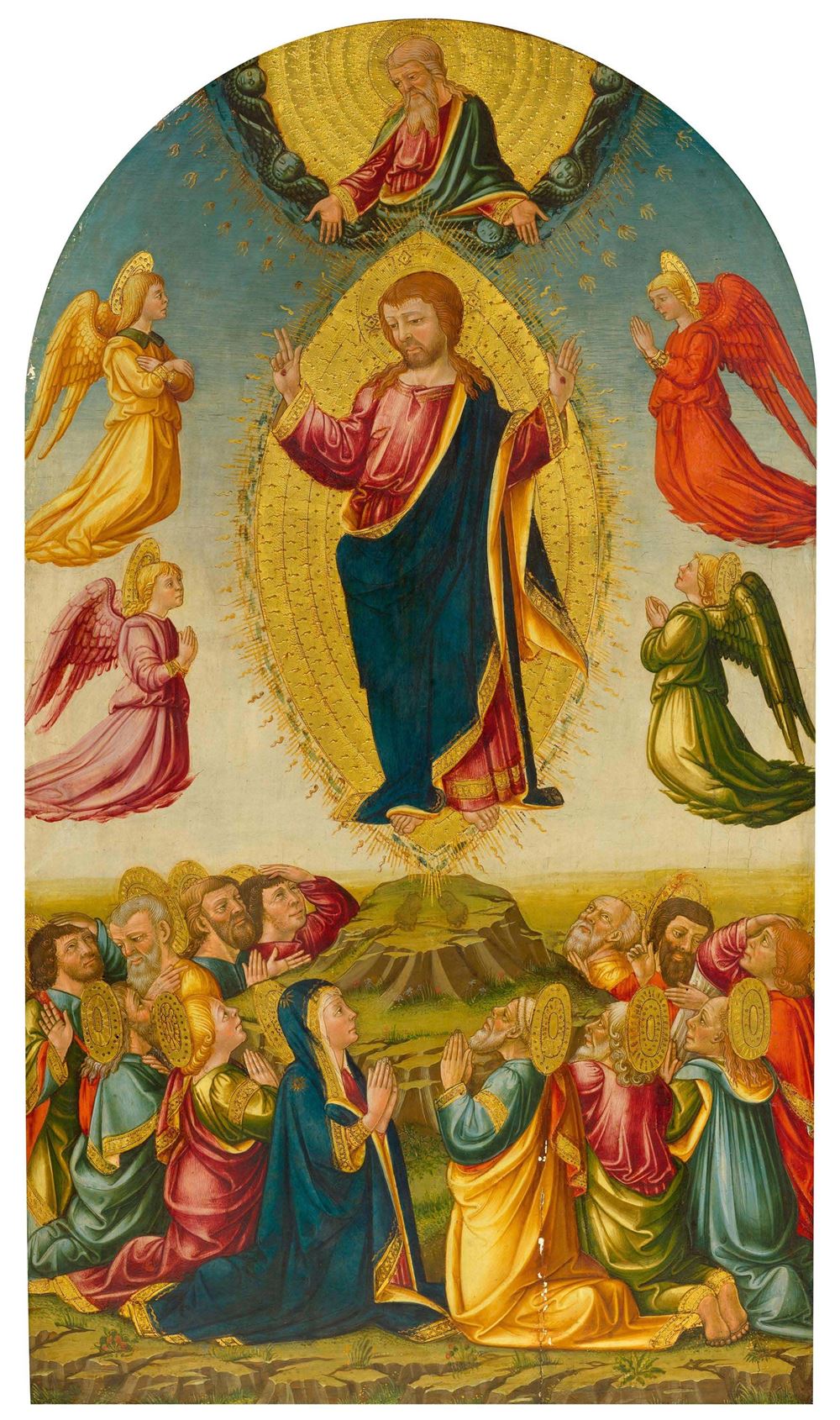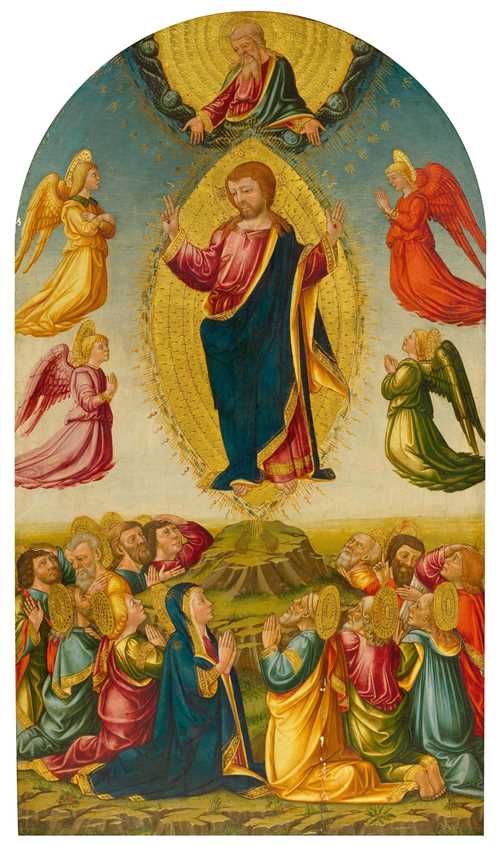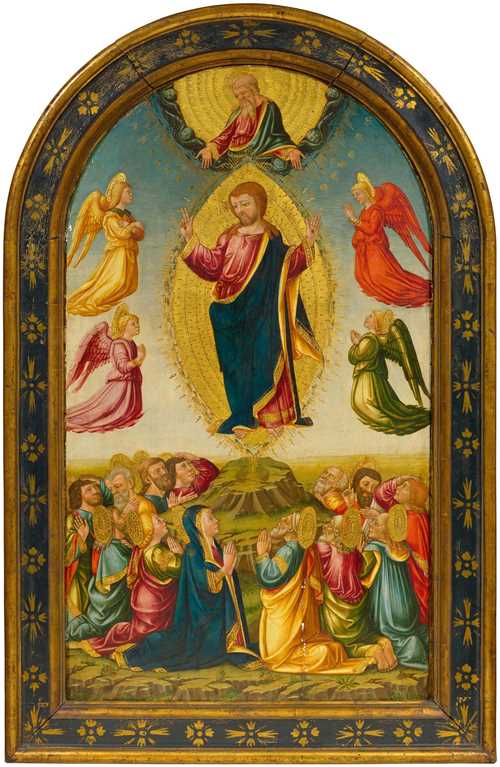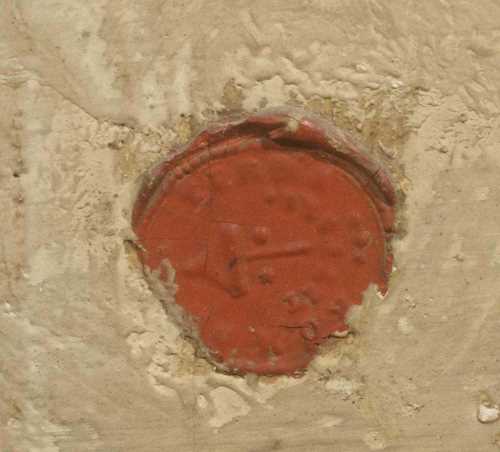
Lot 3001 - A172 Old Master Paintings - Friday, 27. March 2015, 03.00 PM
NERI DI BICCI
(1418 Florence 1492)
The Ascension of Christ. Circa 1475–80.
Tempera and gold ground on panel.
95 × 57 cm.
Literature:
Provenance:
- Collection of Baron Petre, of Essex, probably 19th century (according to a crest in red sealing wax on the back).
- Swiss or German art market, early 20th c. (according to a label on the back).
- Swiss private collection.
An attribution to Neri di Bicci of this richly coloured, gorgeously preserved panel cannot be opposed. In fact, this is a typical work by the prolific Florentine painter Neri di Bicci, the last heir to the famous Florentine painting dynasty established by Lorenzo di Bicci (ca. 1350-1427). The artist's painterly style, which remained largely unchanged throughout his life, was strongly shaped on the traditions of the medieval gold ground painting learnt from his forefathers Lorenzo di Bicci (ca. 1350-1427) and Bicci di Lorenzo (1373-1452), though he modernized his pictorial language by occasionally integrating into his paintings rudimentary classical elements. In rare cases, such as in the Annunciation in the Convento di Certomodo in Poppi (1460) he even chose to place his scenes within the convincingly structured perspective of classicising Renaissance architecture, according to the taste of the great Renaissance painters of his time. But his pictorial world always remained a fabulous and colourful cosmos between heaven and earth where celestial miracles played out. The art historical importance of Neri di Bicci lies particularly in the notes recorded in his diaries (stored in the archive of the Uffizi). They are of fundamental importance to the study of art production at the time, because they provide direct information about the daily life and production of an artist's workshop in Renaissance Florence (see Santi, Bruno (ed.): Neri di Bicci, Le Ricordanze, 10 marzo 1453 -24 aprile 1475 Pisa 1976). From these records we learn also that Neri di Bicci, probably because of his strong technical skills, was sought after as an instructor by, among others, Francesco Botticini, Giusto d'Andrea and Cosimo Rosselli, author of a panel also offered here for sale (lot 3006), who intermittently trained with him. The latter would ascend later to that elite group of painters called to Rome in order to fresco the Sistine Chapel (1481/82). Stylistic considerations and the fact that this painting of the Ascension of Christ offered here does not figure in Neri di Bicci's records between 1453 and April 1475, indicate clearly that it should be placed among his late work after 1475. This is also confirmed by the conception of the golden halos as solid three-dimensional discs, which are found similarly in his later work during the 8th decade of the 15th century. This trend towards a still naïve naturalism, however, is also evident in the exquisite detail of two dark footprints visible on the rocky plateau at centre: shadows cast by the feet of Christ as he ascends to heaven. Stylistically, the present picture joins works such as a panel painting of the Adoration of the Child, formerly in the van Gelder collection, Brussels; or two tabernacle wings, sold at Sotheby's in London on 8 July 2004, which most likely date to the years 1475-80, as our panel.
Neri di Bicci was a technically accomplished and commercially successful painter who knew how to adapt his style to each patron. When it came time to fulfill an urban commission in Florence, as in 1455 within the Vallambrosian church of Santa Trinita, which was decorated in honour of Giovanni Gualberto in accord with the artistic sensibility of the Renaissance fresco, Neri was well-qualified to incorporate modern principles of the Florentine Renaissance in his designs; however, his primary clientele were churches of religious orders and private individuals in the rural areas around Florence, for which he created devotional images in accordance with the traditional aesthetics of colourful gold ground paintings from the Middle Ages.
We thank Prof. Dr. Gaudenz Freuler for his assistance in cataloguing this lot.
- Collection of Baron Petre, of Essex, probably 19th century (according to a crest in red sealing wax on the back).
- Swiss or German art market, early 20th c. (according to a label on the back).
- Swiss private collection.
An attribution to Neri di Bicci of this richly coloured, gorgeously preserved panel cannot be opposed. In fact, this is a typical work by the prolific Florentine painter Neri di Bicci, the last heir to the famous Florentine painting dynasty established by Lorenzo di Bicci (ca. 1350-1427). The artist's painterly style, which remained largely unchanged throughout his life, was strongly shaped on the traditions of the medieval gold ground painting learnt from his forefathers Lorenzo di Bicci (ca. 1350-1427) and Bicci di Lorenzo (1373-1452), though he modernized his pictorial language by occasionally integrating into his paintings rudimentary classical elements. In rare cases, such as in the Annunciation in the Convento di Certomodo in Poppi (1460) he even chose to place his scenes within the convincingly structured perspective of classicising Renaissance architecture, according to the taste of the great Renaissance painters of his time. But his pictorial world always remained a fabulous and colourful cosmos between heaven and earth where celestial miracles played out. The art historical importance of Neri di Bicci lies particularly in the notes recorded in his diaries (stored in the archive of the Uffizi). They are of fundamental importance to the study of art production at the time, because they provide direct information about the daily life and production of an artist's workshop in Renaissance Florence (see Santi, Bruno (ed.): Neri di Bicci, Le Ricordanze, 10 marzo 1453 -24 aprile 1475 Pisa 1976). From these records we learn also that Neri di Bicci, probably because of his strong technical skills, was sought after as an instructor by, among others, Francesco Botticini, Giusto d'Andrea and Cosimo Rosselli, author of a panel also offered here for sale (lot 3006), who intermittently trained with him. The latter would ascend later to that elite group of painters called to Rome in order to fresco the Sistine Chapel (1481/82). Stylistic considerations and the fact that this painting of the Ascension of Christ offered here does not figure in Neri di Bicci's records between 1453 and April 1475, indicate clearly that it should be placed among his late work after 1475. This is also confirmed by the conception of the golden halos as solid three-dimensional discs, which are found similarly in his later work during the 8th decade of the 15th century. This trend towards a still naïve naturalism, however, is also evident in the exquisite detail of two dark footprints visible on the rocky plateau at centre: shadows cast by the feet of Christ as he ascends to heaven. Stylistically, the present picture joins works such as a panel painting of the Adoration of the Child, formerly in the van Gelder collection, Brussels; or two tabernacle wings, sold at Sotheby's in London on 8 July 2004, which most likely date to the years 1475-80, as our panel.
Neri di Bicci was a technically accomplished and commercially successful painter who knew how to adapt his style to each patron. When it came time to fulfill an urban commission in Florence, as in 1455 within the Vallambrosian church of Santa Trinita, which was decorated in honour of Giovanni Gualberto in accord with the artistic sensibility of the Renaissance fresco, Neri was well-qualified to incorporate modern principles of the Florentine Renaissance in his designs; however, his primary clientele were churches of religious orders and private individuals in the rural areas around Florence, for which he created devotional images in accordance with the traditional aesthetics of colourful gold ground paintings from the Middle Ages.
We thank Prof. Dr. Gaudenz Freuler for his assistance in cataloguing this lot.
CHF 60 000 / 80 000 | (€ 61 860 / 82 470)
Sold for CHF 78 000 (including buyer’s premium)
All information is subject to change.



